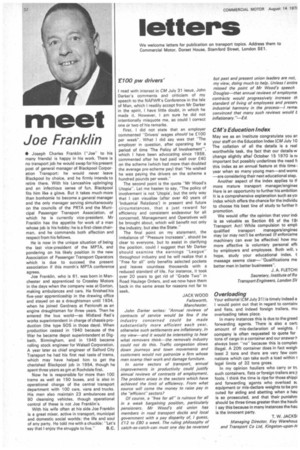letters
Page 34

If you've noticed an error in this article please click here to report it so we can fix it.
We welcome letters for publication on transport topics. Address them to Commercial Motor, Dorset House, Stamford Street, London SE1.
£100 pw drivers'
I read with interest in CM July 31 issue, John Darker's comments and criticism of my speech to the NAFWR's Conference in the Isle of Man, which I readily accept from Mr Darker in the spirit, I have little doubt, in which he made it, However, I am sure he did not intentionally misquote me, so could I correct one or two of his remarks.
First, I did not state that an employer commented "Drivers' wages should be £100 per week". What I did say was that "The employer in question, after operating for a period of time 'The Policy of Involvement—, which I have been advocating since 1959, commented after he had paid well over £40 on the scheme (which had more than doubled the average pre-scheme pay) that "He wished he was paying the drivers on the scheme a hundred pounds per week."
The second point is the quote "Mr Wood's Utopia". Let me hasten to say, -The policy of involvement is not 'Utopia', but the only way that I can visualize (after over 40 years of 'Industrial Relations') in present and future circumstances, that a just reward for efficiency and consistent endeavour for all concerned, Management and Operatives will be brought about, which will benefit not only the industry, but also the State.
The final point on my statement, the imbalance of "Pressure Increases", should be clear to everyone, but to assist in clarifying the position, could I suggest that Mr Darker should examine the earnings "League" throughout industry and he will realize that a "Free for all" only benefits selected pockets and leaves countless thousands with a reduced standard of life. For instance, it took over 20 years to get rid of "Grade Two" in Road Haulage Orders, and we now have them back in the same areas for reasons not far to seek.
JACK WOOD Failsworth, Manchester,
John Darker writes: -Annual reviews of contracts of service would be fine if the industry concerned could be made substantially more efficient each year, otherwise such settlements are inflationary. In my view—and it would be interesting to hear what removers think—the removals industry could not do this. Traffic congestion slows down journeys and town movements and customers would not patronize a firm whose men scamp their work and damage furniture.
In some sectors of transport, annual improvements in productivity could justify annual reviews of contracts of employment. The problem arises in the sectors which have achieved the limit of efficiency. From what source will come the money to raise pay in the "efficient" sectors?
Of course, a "free for all" is ruinous for all in a weak bargaining position, particularly pensioners. Mr Wood's old union has members in road transport docks and local government with a pay disparity of, I guess, £12 to £80 a week. The ruling philosophy of catch-as-catch-can most one day be reversed
but past and present union leaders are not, my view, doing much to help. Unless I entire missed the point of Mr Wood's speech Douglas—that annual reviews of employme, contracts would progressively increase th standard of living of employees and presert, industrial harmony in the process—I roma, convinced that many such reviews would t inflationary.--Ed.
CM'S Education Index
May we as an institute congratulate you an your staff on the Education Index (CM July 10 The collation of all the details is a real worthwhile task, the fact that our details w change slightly aftd October 15 1970 is m important but possibly underlines the need fl this index as an annual feature at this time year when so many young men—and worn( —are considering their next educational step.
Another aspect of the index applies to if more mature transport manager/engineE Here is an opportunity to further his ambition It is a comprehensive explanation such as yo' index which offers the chance for the individu to choose his best line of study to further h promotion.
We would offer the opinion that your ind, is as valuable as Section 65 of the 191 Transport Act! While compulsion to empl.
qualified transport managersiengine€ may (or may not!) be enforced (if enforceme machinery can ever be effective) how mu more effective is voluntary personal effr by employers and employees. Both will, hope, study your educational index, t message seems clear—"Qualifications me better men in better businesses".
J. A. FLETCHI Secretary, Institute of Re Transport Engineers, London
Overloading
Your editorial (CM July 31) is timely indeed a I would point out that in regard to containi and fiats, and indeed foreign trailers, mu overloading takes place.
In many instances this is due to the greed forwarding agents. There is also a core amount of mis-declaration of weights. I company is often requested to quote for tons of cargo in a container and our answer (always been "nobecause this is complet illegal. A 20ft container does in fact weigh least 2 tons and there are very few corn nations which can take such a load within 1 legal limits of 32 tons gross.
In my opinion hauliers who carry or trt such containers, flats or foreign trailers are ji fools. I think the time is ripe for those shippi and forwarding agents who overload st equipment or mis-declare weights to be pro cuted for aiding and abetting when a hau is so prosecuted, and that their punishm should be three times greater than the haulii I say this because in many instances the hau is the innocent party.
T. W. JACKS!
Managing Director, Key Warehous and Transport Co Ltd, Kingston-upon-h




























































































